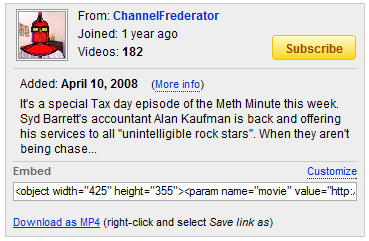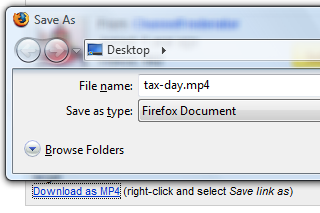Tuesday, April 22, 2008
R & Bioconductor Resources
1.
Introduction to R for biologists (by Natalie Roberts, WEHI, Melbourne)
2.
R manuals under link "Manuals" (left column)
3.
manuals: http://cran.r-project.org/manuals.html
4.
R tutorial: http://www.personality-project.org/r/
5.
R package: Statistics for Microarray Analysis
6.
UCR bioinformatics workshop http://faculty.ucr.edu/~tgirke/Workshops.htm
Tuesday, April 15, 2008
Download YouTube Videos as MP4 Files
From http://googlesystem.blogspot.com/2008/04/download-youtube-videos-as-mp4-files.html
An interesting side-effect of YouTube's recent push for higher quality videos is that most videos can be downloaded as MP4 files directly from YouTube. Until now, you could only get FLV files from your browser's cache or using one of the many websites that let you download YouTube videos. In fact, to download the MP4 files, you need to use the same URL like for FLV files and append "&fmt=18":
http://www.youtube.com/get_video?video_id=ID&t=SIGNATURE&fmt=18
ID is the video's identification value, SIGNATURE is a value that prevents you from downloading the file just by knowing the ID. You could create this URL by looking at the source code of a YouTube page, but it's much easier to automatically generate it.
One way is to save the following link as a bookmarklet by dragging it to your Links bar (in Firefox, Safari) or right-clicking and adding it to your favorites (in Internet Explorer, Opera):

If you didn't manage to add the bookmarklet, this post has more detailed instructions.
When you want to download a YouTube video, click on the bookmarklet and you should see a new option below the embeddable code.

Because YouTube doesn't send the right MIME type, you shouldn't click on the download link. Right-click and select "save link as" or "save target as" and enter a proper name for the video. Make sure to use the .mp4 extension when you enter the filename.

Having to click on the bookmarklet is annoying, so this Greasemonkey script is a better alternative because it adds the download link automatically. It requires the Greasemonkey extension for Firefox or a similar plug-in for userscripts. Opera has built-in support for userscripts, so you only need to go to Tools > Preferences > Advanced > Content > JavaScript options, select the directory where you will put your script and copy the script to that directory.
YouTube's MP4 files have a higher resolution, stereo sound and can be played with applications like VLC, MPlayer, iTunes, QuickTime. Not all YouTube videos can be downloaded as MP4 files and the fallback format is FLV.
Note that YouTube's terms of use require you "not to access User Submissions or YouTube Content through any technology or means other than the video playback pages of the Website itself, the YouTube Embeddable Player, or other explicitly authorized means YouTube may designate," so these scripts could break YouTube's policies. The scripts only download files that are used by YouTube's player, so you may also find the videos in your browser's cache.
Sunday, April 13, 2008
China’s Loyal Youth
// I believe what happened recently will make most people to think about it, and it will have a lasting influence. There will be wind of change in a mild way in the following years. I expect a better human right records.
MANY sympathetic Westerners view Chinese society along the lines of what they saw in the waning days of the Soviet Union: a repressive government backed by old hard-liners losing its grip to a new generation of well-educated, liberal-leaning sophisticates. As pleasant as this outlook may be, it’s naïve. Educated young Chinese, far from being embarrassed or upset by their government’s human-rights record, rank among the most patriotic, establishment-supporting people you’ll meet.
As is clear to anyone who lives here, most young ethnic Chinese strongly support their government’s suppression of the recent Tibetan uprising. One Chinese friend who has a degree from a European university described the conflict to me as “a clash between the commercial world and an old aboriginal society.” She even praised her government for treating Tibetans better than New World settlers treated Native Americans.
It’s a rare person in China who considers the desires of the Tibetans themselves. “Young Chinese have no sympathy for Tibet,” a Beijing human-rights lawyer named Teng Biao told me. Mr. Teng — a Han Chinese who has offered to defend Tibetan monks caught up in police dragnets — feels very alone these days. Most people in their 20s, he says, “believe the Dalai Lama is trying to split China.”
Educated young people are usually the best positioned in society to bridge cultures, so it’s important to examine the thinking of those in China. The most striking thing is that, almost without exception, they feel rightfully proud of their country’s accomplishments in the three decades since economic reforms began. And their pride and patriotism often find expression in an unquestioning support of their government, especially regarding Tibet.
The most obvious explanation for this is the education system, which can accurately be described as indoctrination. Textbooks dwell on China’s humiliations at the hands of foreign powers in the 19th century as if they took place yesterday, yet skim over the Cultural Revolution of the 1960s and ’70s as if it were ancient history. Students learn the neat calculation that Chairman Mao’s tyranny was “30 percent wrong,” then the subject is declared closed. The uprising in Tibet in the late 1950s, and the invasion that quashed it, are discussed just long enough to lay blame on the “Dalai clique,” a pejorative reference to the circle of advisers around Tibet’s spiritual leader, the Dalai Lama.
Then there’s life experience — or the lack of it — that might otherwise help young Chinese to gain a perspective outside the government’s viewpoint. Young urban Chinese study hard and that’s pretty much it. Volunteer work, sports, church groups, debate teams, musical skills and other extracurricular activities don’t factor into college admission, so few participate. And the government’s control of society means there aren’t many non-state-run groups to join anyway. Even the most basic American introduction to real life — the summer job — rarely exists for urban students in China.
Recent Chinese college graduates are an optimistic group. And why not? The economy has grown at a double-digit rate for as long as they can remember. Those who speak English are guaranteed good jobs. Their families own homes. They’ll soon own one themselves, and probably a car too. A cellphone, an iPod, holidays — no problem. Small wonder the Pew Research Center in Washington described the Chinese in 2005 as “world leaders in optimism.”
As for political repression, few young Chinese experience it. Most are too young to remember the Tiananmen massacre of 1989 and probably nobody has told them stories. China doesn’t feel like a police state, and the people young Chinese read about who do suffer injustices tend to be poor — those who lost homes to government-linked property developers without fair compensation or whose crops failed when state-supported factories polluted their fields.
Educated young Chinese are therefore the biggest beneficiaries of policies that have brought China more peace and prosperity than at any time in the past thousand years. They can’t imagine why Tibetans would turn up their noses at rising incomes and the promise of a more prosperous future. The loss of a homeland just doesn’t compute as a valid concern.
Of course, the nationalism of young Chinese may soften over time. As college graduates enter the work force and experience their country’s corruption and inefficiency, they often grow more critical. It is received wisdom in China that people in their 40s are the most willing to challenge their government, and the Tibet crisis bears out that observation. Of the 29 ethnic-Chinese intellectuals who last month signed a widely publicized petition urging the government to show restraint in the crackdown, not one was under 30.
Barring major changes in China’s education system or economy, Westerners are not going to find allies among the vast majority of Chinese on key issues like Tibet, Darfur and the environment for some time. If the debate over Tibet turns this summer’s contests in Beijing into the Human Rights Games, as seems inevitable, Western ticket-holders expecting to find Chinese angry at their government will instead find Chinese angry at them.
Tuesday, April 08, 2008
Tibetan Protests Attacks Olympic Torch Holder, Who is a disabled female in wheelchair

As a Chinese, I personally wish the Olympic torch relay will unite people of different belief. I hope it leads to a "journey to harmony" . However, you have the freedom of speech and the right of demonstration. I respect that; indeed your voices are heard. But, take care: don't turn a legal demonstration into a violent turmoil; don't do anything as shown in the following video again (if you choose not to watch this, I call tell you, in this video, Tibetan protestants attacked the Olympic torch holder, who is a disabled female in wheelchair). don't add to our hatred. What happened yesterday makes me worried 'cause you know hatred makes peaceful resolutions more hopeless.
And follow Dalai Lama's teaching (cited from Statement of His Holiness the Dalai Lama to All Tibetans)
8. The hosting of the Olympic games this year is a matter of great pride to the 1.2 billion Chinese people. I have from the very beginning supported the holding of these Games in Beijing. My position on this remains unchanged. I feel the Tibetans should not cause any hindrance to the Games. It is the legitimate right of every Tibetan to struggle for their freedoms and rights. On the other hand, it will be futile and not helpful to anyone if we do something that will create hatred in the minds of the Chinese people. On the contrary, we need to foster trust and respect in our hearts in order to create a harmonious society, as this cannot be built on the basis of force and intimidation.